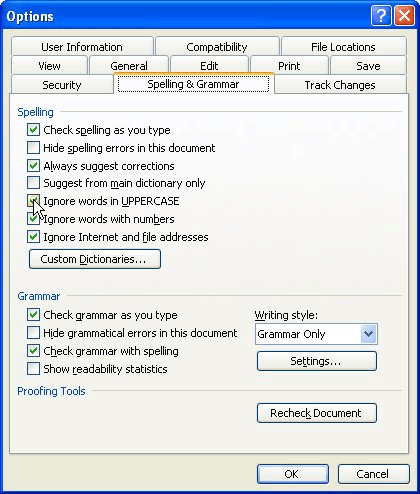Please Note: This article is written for users of the following Microsoft Word versions: 97, 2000, 2002, and 2003. If you are using a later version (Word 2007 or later), this tip may not work for you. For a version of this tip written specifically for later versions of Word, click here: Spell-checking Uppercase Words.
Written by Allen Wyatt (last updated March 24, 2018)
This tip applies to Word 97, 2000, 2002, and 2003
Word includes a powerful spell-checker that, in reality, does a pretty good job. If you do quite a bit of technical writing and use a lot of acronyms, you know that most of them are easily flagged as misspelled words. You can make sure that Word ignores uppercase words in any spell-check by following these steps:

Figure 1. The Spelling & Grammar tab of the Options dialog box.
The only downside to making this configuration change, of course, is if you use all uppercase for section titles or for other special words. In this case, Word still ignores them, since they are uppercase. Make sure you change the setting of this check box based on the type of work you are doing in your current document.
WordTips is your source for cost-effective Microsoft Word training. (Microsoft Word is the most popular word processing software in the world.) This tip (66) applies to Microsoft Word 97, 2000, 2002, and 2003. You can find a version of this tip for the ribbon interface of Word (Word 2007 and later) here: Spell-checking Uppercase Words.

Discover the Power of Microsoft Office This beginner-friendly guide reveals the expert tips and strategies you need to skyrocket your productivity and use Office 365 like a pro. Mastering software like Word, Excel, and PowerPoint is essential to be more efficient and advance your career. Simple lessons guide you through every step, providing the knowledge you need to get started. Check out Microsoft Office 365 For Beginners today!
Like many things in Word, you can configure the way the spelling checker does its job. If you want to exercise more ...
Discover MoreWhen Word checks the grammar it thinks you are using in your prose, it follows a set of rules. Fortunately the program ...
Discover MoreSpell check a document, and Word normally checks several different dictionaries. Here's how to limit the dictionary ...
Discover MoreFREE SERVICE: Get tips like this every week in WordTips, a free productivity newsletter. Enter your address and click "Subscribe."
2022-01-23 00:59:58
Steve Baker
I write a lot of Usenet posts that have a subject header field. I capitalize some words for emphasis and want these words completely ignored when I run them through a macro I have set up. The macro is simple. It takes the words I've highlighted and copied and runs the "change case" to capitalize all words. Then it runs the spell checker part of the macro. If a word, such as "LOL" is in the title, it gets ignored, because that word is not in the default dictionary and spell check is set to ignore capped words. However, if I cap the word "COOL", which IS in the dictionary, Word changes the case to first letter only.
Ex: "LOL... He Thinks He's COOL", gets changed to "LOL... He Thinks He's Cool" - LOL stays the same because it's not in the dictionary and gets ignored. I want words that I've capitalized to stay capped.
I've put "COOL" in exclusionary dictionaries and can't seem to get it to work. Any suggestions? Thank you for your time.
Got a version of Word that uses the menu interface (Word 97, Word 2000, Word 2002, or Word 2003)? This site is for you! If you use a later version of Word, visit our WordTips site focusing on the ribbon interface.
Visit the WordTips channel on YouTube
FREE SERVICE: Get tips like this every week in WordTips, a free productivity newsletter. Enter your address and click "Subscribe."
Copyright © 2026 Sharon Parq Associates, Inc.
Comments